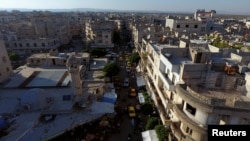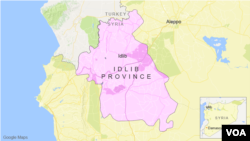Syrian rebels are readying for a government assault on the country’s northwestern Idlib province, their last major stronghold in a country that’s been wracked by a seven-year war, leaving half a million dead and more than 5 million Syrians languishing as refugees in neighboring countries.
Rebel commanders fear an offensive will be launched by mid-September, when a de-escalation agreement negotiated by Russia and backed by Iran and Turkey expires. With President Bashar al-Assad saying his forces intend to retake control of Idlib, U.N. officials have warned of an impending humanitarian crisis, fearing for the well-being of 2.5 million to 3.3 million people estimated to be living in the province, half of them displaced by fighting in other parts of the country.
Assad’s forces have stepped up their bombing campaign on the province, according to Syrian civil society activists. On Monday, a girl and two women were killed and half a dozen civilians wounded in government shelling of the towns of al-Tih and Tahtaya. Dozens of airstrikes, as well as artillery shelling, pummeled villages and towns in the mainly rural province Friday, monitors said.
“It’s the most intense bombing since Idlib was declared a de-escalation zone last year,” Rami Abdel Rahman, head of the monitoring group the Syrian Observatory for Human Rights, told AFP.
Last week, David Miliband, a former British foreign minister and now president of the International Rescue Committee, lamented the sidelining of the United Nations when it comes to the endgame of the Syrian war and urged the Security Council to reassert itself quickly to head off an assault on Idlib.
“Armed opposition groups from elsewhere in the country have been deported there under so-called reconciliation agreements and are preparing for a last stand against the Assad regime,” he wrote in an opinion article for The Washington Post. “Standing between rebels and the regime are 2.6 million civilians, half of whom have already been displaced at least once by fighting. One million seven hundred thousand people already need humanitarian aid to survive,” he added.
Charles Lister, author of the book “The Syrian Jihad” and an analyst with the Middle East Institute, agrees an Idlib assault would lead to a bloodbath.
“Should the regime unleash what would inevitably be a brutal military campaign upon Idlib, it would be civilians who would suffer immeasurably — and in larger numbers than ever before,” he said.
It remains unclear whether Assad will mount a province-wide offensive when the de-escalation agreement expires Sept. 19. The decision will depend heavily on Russian leader Vladimir Putin, said analysts. The Russian president is being urged by his Turkish counterpart Recep Tayyip Erdoğan not to green-light an attack by Assad, whose regime only survived thanks to Moscow’s military intervention.
Erdogan has declared Idlib, where an estimated 70,000 armed rebels are holed up, off-limits to Assad. In an interview with VOA last month, one of his advisers said Turkey has warned Damascus off Idlib, which borders a swathe of Syrian territory to the east occupied by Turkish forces. He said Ankara would not stand by if Damascus moved on Idlib. “Idlib is a red line for us. As you know, we have our forces deployed there," the adviser said.
That message was reiterated to Russian Foreign Minister Sergei Lavrov, who arrived Monday in Ankara to plan for an international summit next month on Syria led by Russia and Turkey.
Turkish forces have set up a dozen military observation posts across Idlib province, which abuts Turkey, as part of the de-escalation agreement with Tehran and Moscow reached under the Astana peace negotiations. An assault on Idlib would prompt another refugee crisis for Turkey and challenge Turkish influence in northern Syria.
If Putin accedes to the Turkish entreaties, Assad would be in a tough spot, according to Aron Lund, an analyst at the U.S.-based Century Foundation. He said the Syrian army would have trouble retaking Idlib without Russian support. “Most key decisions are now in the hands of outside powers, with understandings and misunderstandings among Russians, Americans and Turks most likely to decide the future shape of Syria,” he said in an email.
Russian officials have said they are opposed to an escalation in hostilities in Idlib.
Some analysts question whether Assad can be restrained. “It is unclear whether Russia or Turkey have what it takes to deter Assad from initiating a major military campaign,” said Lister in an email.
For Russia, an assault on Idlib presents the risk of a military clash between Turkey and Syria, in effect, two Russian allies.
The best solution for the Kremlin, say some analysts, may be to persuade Ankara to agree to Assad launching a limited offensive aimed at taking back the southern part of Idlib province but leaving Turkish influence in northwest Syria largely unchallenged.
Writing in the World Policy Review, Lund noted, “It wouldn’t be a clean end to the war, but does Moscow really need that? From Moldova to South Ossetia and eastern Ukraine, the Kremlin has a habit of letting messy situations linger to its advantage.”





